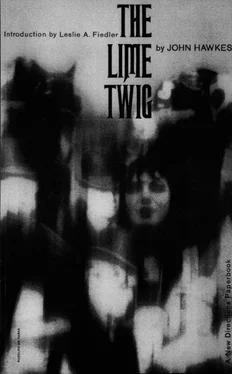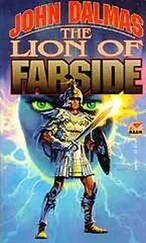She felt that she herself could die. In those early hours she had not thought to scream. But now she was prostrate in Little Dora’s Roost and even Little Dora, who hated them playing cards, was gone. And without the presence of some other woman, any woman, she could die. Thick had been too rough with her, treated her too roughly, and some things didn’t tolerate surviving, some parts of her couldn’t stand a beating. She hadn’t even her free hands with which to rub them.
So finally she sobbed several times in this hour before the dawn. The moon had failed, the last clothes off her back were torn to shreds, the ginger cake they had given her at noon sat half-eaten and bearing her teeth marks in a chipped saucer atop the wardrobe. The moonlight’s wash reached the window and fell across the brass and Margaret on the bed: a body having shiny knees, white gown twisted to the waist, arms stretched horizontal to the end of the bed and crossed; gray mattress-ticking beneath the legs whose calves were swollen into curves, and the head itself turned flat in the same direction she had raised one hip, away from the farther wall against which Thick snored; and a wetness under the eye exposed to the wash of light and the sobs just bubbling on the lips. Margaret inert, immobile, young woman with insides ruptured and fingers curling at the moment of giving sound to her grievance.
The sobs were not sweet. They were short, moist, lower than contralto, louder than she intended; the moanings of a creature no one could love. But Monica must have heard them — Monica whom Little Dora had brought back to the Roost after Thick himself had gone to sleep — or perhaps those sobs merely coincided with sobs of the child’s own. Because when Margaret sobbed aloud, Monica sat up screaming.
The girl was given to having nightmares. All day long she was clever, turning away her inoculated arm, hiding inside her fists the little sharp black lines of her fingernails, walking on heels to prevent the sole of her left sandal from flapping, winning every afternoon at cards, though she had no use for horses. At the sink in the closet she spent time daubing herself with drops of Paradise Shore from a vial — shaped like a slipper — which she carried in a small white purse with a handle. She was forever finding hairpins on the floor and putting them quickly to her head. And she drank tea with her legs crossed and her good arm — the one without the scab — thrown over the back of the chair. Tall for her age, thin, not yet able to read, wearing socks that didn’t reach to her ankles and a cameo ring tied from finger to wrist with a length of green ribbon, readily speaking of the pets — all suicides she said — which she had kept in their Farthing Maude flat, she was pale and bony and still smelling of dolls she had cared for, a girl expecting no favors in her bright-green dress, though sufficient enough in the daylight.
“She’s being too friendly with the prisoner,” Thick said whenever he could.
But at night there were horrors. At night she sweated her innocence and, bolting up in her shift, declared she’d been swimming in the petrol tank of a lorry, or watching three rubber dolls smartly burning, or sitting inside a great rubber tire and rolling down a steep cobbled hill in the darkness. And Margaret remembered these dreams.
Now Margaret’s sobs and Monica’s screams commenced together and continued together, variants of a single sound, screaming and weeping mingled. Margaret was lying with puffy red eyes closed but fully conscious of the mingling sounds. Monica was sitting upright on the brass bed next to her, not in the shift but merely in panties this night, and half the childish head of hair was down, the pins kept falling — a small body untouched, unidentified, except by arm bandage and the panties, and her eyes were shining open. Yet she was asleep, and between the two stripped beds and on the opposite wall the washed-back glow of the moon was lighting the cheap print in its glassless frame, print of a young woman who — in moonlight herself and with long hair drawn frontward across her chest, with two large butterflies sleeping upon her shoulders — was in the act of stepping into the silver pond to drink. So Margaret felt the two sounds coming from herself, starting from the same oppressive breast, as if the other half of sadness was quite naturally fear. And Margaret then opened her eyes and her face was toward Monica’s bed and her arms were spasmodically flexing a little against rope and unyielding wrists and brass.
“Ducky,” she whispered then, no longer sobbing, “Ducky. …”
Monica’s head was lifted and the neck was stretched. There was a white thread hanging from the opened lips and it blew gently in the vibrations of the scream. The tooth-marked cake was on the wardrobe behind her.
“Ducky … wake up now, Ducky.”
She was not awake yet, but she began to move: the graceless motions of the undressed dreaming child, fumbling off the bed, crouching and bending over as if the dream lay in the white innocent oval of her belly, stooped but holding the tiny hands out trembling to sense the night, and neither falling nor gliding across the distance between the beds yet coming on with a kind of limbless instinct, all disarrayed as an adult woman walking in the night. Until suddenly the little girl collapsed, fell forward, and buried the scream between Margaret’s cheek and the ticking. And by touch of the child’s skin, she knew that her own cheek was wet.
“Wake up, wake up,” she whispered, and still Thick snored and she could not hold the girl.
But Monica’s hands were clinging. She smelled the odors of soap and Paradise Shore and there was a hand upon her own shoulder making the flesh feel large, and the other small wedge-shaped hand was thrust between the mattress and her breast. Her lips were against the child’s eyes and she could taste them. Somewhere she was losing blood, but there was no longer any sobbing or screaming. Only the melting dream, the feel of a dangling hairpin and at the foot of the empty bed next her own the dark-blue shade of one of Monica’s sandals.
“Ducky,” whispering against the eyes, “feeling a little better? There’s a girl.”
In the silence, glancing away from the face, she felt the child’s fingers and touch of the cameo ring starting again at the round of her own shoulder; then traveling lightly away to the elbow and reaching the wrists, stopping. And followed by the other hand until both the child’s arms were outstretched and come to a point atop her own, so that despite the cold and numbness she felt the grip, while somewhere below her waist she seemed to be sinking, caving in wall by tissue wall.
“Poor Margaret,” said the little girl, “I could cry, I could. …”
“See can you do anything with the knots,” she whispered then.
Monica knelt on the ticking near Margaret’s head — a thin bent back, silver between the ribs, bowed as if for an old woman’s drunken hand — and tried to work the rope ends.
“I can’t,” leaving off, soothing her fingers against the coolness of the brass. “What are we going to do?”
“Perhaps you could put a coat round me,” she whispered at last. “If only Michael knew. …”
So the child fetched Little Dora’s coat and spread it over Margaret and brought a glass of water and Banks’ wife drank — some of it spilled and wet the mattress— and Monica dressed herself in the discarded green dress and sandals and socks. And on her own bare bed again: “Larry’ll make him turn you loose. I promise.”
“Yes. Go to sleep now, Monica.” She watched the child lying firmly in the moonlight, watched two small hands carry the cake up and into the shadow of the mouth, listened to the rigid and fragile sounds of chewing. Later she heard Monica brush away the crumbs, lie still again.
Читать дальше












